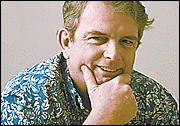Advertisement - Click to support our sponsors.


The Way I See It
WHEN I first learned that Moroccan-born Khalid Khannouchi wanted to run for the U.S. in the Olympic marathon, I had mixed feelings. Khannouchi more
than a ringerI thought, why should this country, which hasn't had a top international marathoner since the mid-1980s, turn to a foreign world record holder to salvage our dignity in the event?
Better to wait until we grow one of our own than to import a ringer.
But the more I learned about Khannouchi, the more I came to believe in him. Khannouchi was never asked to come here. He came on his own to New York seven long years ago in the tradition of so many immigrants before him.
And he immediately wanted to become an American citizen. Shortly after he married his wife, Sandra Inoa, in 1996, he started the paperwork to earn citizenship.
That process hit a major snag when his INS caseworker was convicted of unrelated conspiracy and bribery charges. But he obtained permanent residency in 1998 and did all he could to shorten the three-year waiting period for citizenships.
In the meantime, he did something no one else has ever done in running history.
LAST fall, in the LaSalle Bank Chicago Marathon, he became the only human ever to run faster than two hours and six minutes in a marathon (2:05:43).
The point is, when Khannouchi left Morocco, he wasn't the world's best.
"He got good HERE," said Frank Shorter, the last American to win the Olympic marathon (1972).
Khannouchi was surprised to get his citizenship as early as May 2, thanks to Section 319 (b) of the Immigration and Nationality Act. That section says anyone with a spouse working overseas in "development of foreign trade," which Sandra Inoa was doing, can be naturalized.
But Khannouchi was not given any reason to think his citizenship would be approved until much later, so he opted to run in the lucrative London Marathon on April 16. There he aggravated an injury that kept him out of Sunday's U.S. men's Olympic trials marathon in Pittsburgh. It was the end of Khannouchi's dream, a dream that could've returned the U.S. to world prominence in the marathon.
"It is tragic," said Shorter. But then he began to chuckle. "Now I think of all those people in the U.S. Olympic trials who were saying no, he shouldn't be allowed to do it. Then none of them runs under 2:15:00."
THERE were statements made by some of the top seeds before the trials that Khannouchi didn't belong. Let us qualify our own team, they said.
Well, as it turned out, even the winner of the trials, Rod DeHaven (2:15:3), couldn't run under the Olympic qualifying standard of 2:14:00. So only DeHaven, by virtue of his trials win, will be admitted to the Olympic marathon.
Christine Clarke failed to make the women's Olympic qualifying standard when she won her U.S. trials.
So instead of sending the maximum three men and three women to the marathons in Sydney, we will send one for each.
"Absolutely, that's an all-time low for U.S. marathoning," said Kenny Moore, who finished fourth behind Shorter in 1972.
Shorter and Moore have a right to wince. They combined with Jack Bacheler (ninth) in Munich to post the best finish of any U.S. Olympic marathon team in history.
I'm glad Khannouchi is finally an American. He'll run for the U.S. next year in the world championships and I know he'll kick-start our pride in the marathon.
Pat Bigold has covered sports for daily newspapers
in Hawaii and Massachusetts since 1978.